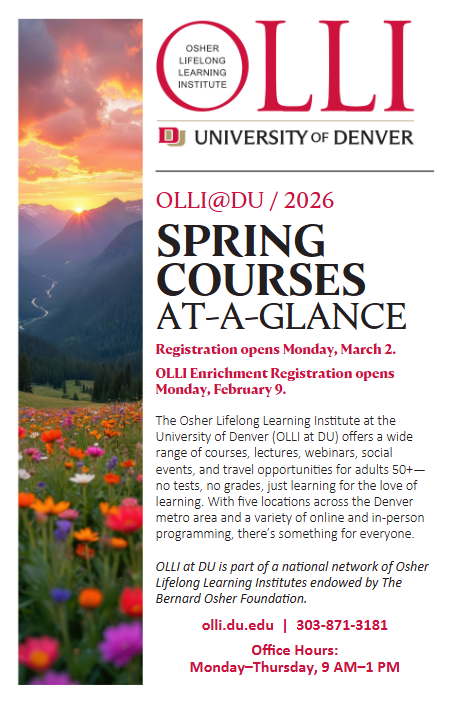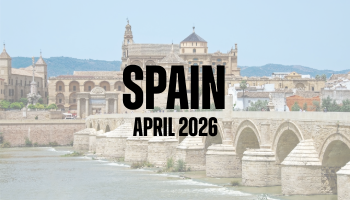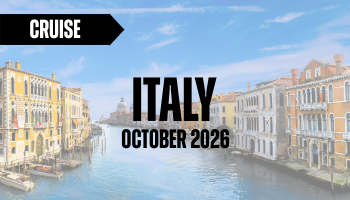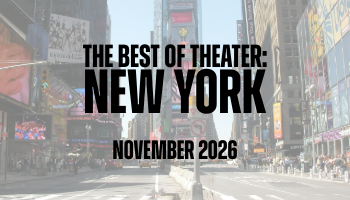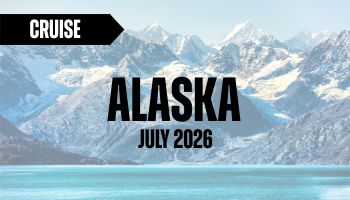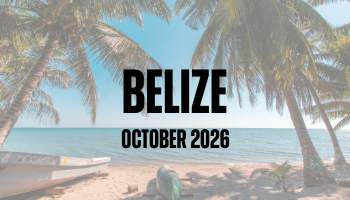COURSE OFFERINGS
Courses & Programs
At OLLI at DU, we believe learning is a lifelong adventure. With programs across the Denver area and online, you can explore new interests, connect with others, and enjoy engaging courses led by passionate facilitators. Whether you prefer online flexibility, in-person classes, interest groups, or travel, there’s something for everyone. Scroll down to learn more and register!
Our Courses
Annually, OLLI at DU offers hundreds of courses online and in-person in 8 subject areas divided between 3 terms. Our extensive curriculum is taught by passionate facilitators who bring their expertise and enthusiasm into the classroom.
Webinars
Friday STEM webinars are FREE for OLLI at DU members. Held on Zoom Friday mornings 10-11:30am, join us for captivating concepts presented by esteemed speakers.
OLLI Fit Classes
OLLI Fit classes are FREE for OLLI at DU members. These fun and dynamic classes are designed for adults who want to stay active, improve fitness, and have a great time doing it. Held on Zoom Monday–Thursday mornings 8–9am.
Special Programs and Events
TOURS AND SPECIAL EVENTS
Enjoy access to fascinating destinations, expert-led lectures, and unique events exclusive to OLLI members. Whether it’s behind-the-scenes museum visits, historical site explorations, or guest speaker events, don’t miss out on these unforgettable experiences!
OLLI ON THE MOVE
Explore our featured off-site courses happening throughout the Denver area. Join us for OLLI on the Move! OLLI at DU membership is not required for these special courses, so bring a friend! Registration and fees do apply.
Interested in bringing OLLI on the Move to your community? Contact us at olli@du.edu.
CALENDAR
OLLI at DU Travel
Embark on unforgettable journeys with OLLI at DU’s exclusive group travel experiences for members only! Designed for curious minds and adventurous spirits, OLLI Travel offers expertly curated trips to exciting destinations in the US and around the globe. Explore new cultures, deepen your knowledge, and connect with fellow travelers in a meaningful way.
Click on our exciting 2025-2026 destinations to learn more:
Questions? Contact our Travel Coordinator, Christine Liptak at Christine.Liptak@DU.edu
Shared Interest Groups
Shared Interest Groups (SIGs) are an exciting perk designed to enrich your OLLI experience by bringing together members who share common interests. Unlike traditional courses, they are run entirely by OLLI members who handle coordination and communication. Join a SIG today and spark new connections while participating in your favorite hobbies!
Do you have an idea for a SIG?
Questions about SIGs? Email Darcey VanWagner at Darcey.VanWagner@DU.edu.
Course Policies & Procedures
WAITLIST POLICY
If a course or event is full, a waitlist will open automatically during online registration. You may add yourself to the waitlist, and if a spot becomes available, you’ll receive an email notification. You’ll have 24 hours to register and pay before the spot is offered to the next person on the list. Waitlisted spots will only be offered through the first week of classes; after that, no additional seats will be filled. Please note that the course fee remains the same regardless of when a participant joins from the waitlist.
REFUND POLICY
Refunds are available based on the type of course or event. For multi-week courses, members are eligible for a full refund if they cancel before or during the first week; no refunds or partial refunds will be issued after that point. For one-day courses, a full refund is available if the cancellation is made at least three business days before the course date. Refunds for special events vary and are determined on a case-by-case basis—please refer to the specific event details on our website or contact the office for more information. If you have extenuating circumstances, please contact the office.
WEATHER POLICY
Your safety is our top priority. Please use your best judgment when deciding whether to travel to class during inclement weather.
General Closure Guidelines
In-person classes at each OLLI at DU location follow the weather closure decisions of the corresponding local school district or the University of Denver (DU), as outlined below.
- If the local school district or DU campus (for DU-based classes) is closed, OLLI classes at that location are cancelled.
- If the school district announces a delayed start, OLLI classes will still be held at their regularly scheduled time.
- If the local school district has an in-service day that coincides with bad weather, a closure may not be announced publicly. In those cases, please check the OLLI website or call the OLLI office for location-specific updates.
- If you are uncertain about whether your class will be held, please call the OLLI office at 303-871-3090. The voicemail greeting will be updated by 7:00 a.m. on days with weather concerns to reflect any closures or schedule changes.

